Mastering Hard Boiled Eggs with Air Fryer Techniques
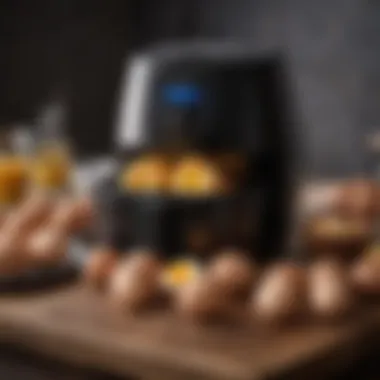
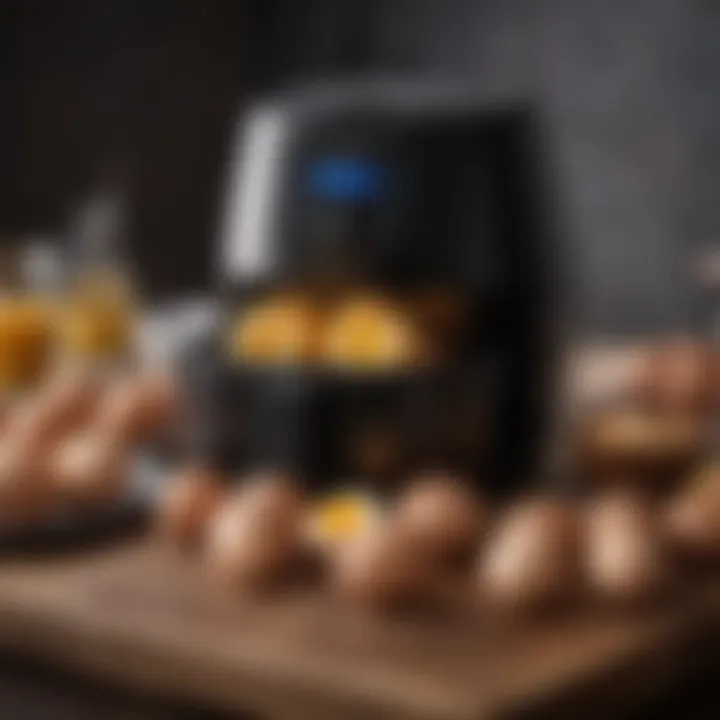
Intro
Cooking hard boiled eggs in an air fryer may seem unconventional, yet it offers a unique, efficient approach to a classic culinary task. This method not only simplifies the cooking process but also enhances control over the final results, allowing for varied textures depending on preference. The air fryer serves as an excellent alternative to traditional boiling or steaming methods, often yielding consistently good outcomes. The objective of this guide is to provide precise, actionable details on how to navigate this technique, making it accessible for cooks of all experience levels.
Understanding the timings, temperatures, and post-cooking techniques can fundamentally affect the outcome. Many cooks might already have some hesitation about using an air fryer effectively. Therefore, this guide will cover essential steps from preparation to troubleshooting, ensuring that your experience is smooth and successful. With the right approach, you will be able to produce hard boiled eggs that are not only delicious but perfectly cooked to your liking.
Prologue to Hard Boiled Eggs
Hard boiled eggs are a culinary staple found in many diets around the world. They provide a rich source of protein and healthy fats. In this article, we will explore how to cook hard boiled eggs using an air fryer, a method that enhances convenience and precision. This introduction not only serves to highlight the significance of incorporating hard boiled eggs into one’s diet, but also underscores the advantages of air frying in preparing these eggs effectively.
The nutritional benefits of hard boiled eggs make them an excellent choice for snacks and meals, catering to various dietary preferences. This method of cooking maintains the integrity of the egg, allowing for optimal texture and taste. Understanding how to cook hard boiled eggs effectively can transform simple dishes into nutritious options.
Nutritional Benefits of Hard Boiled Eggs
Hard boiled eggs provide a multitude of nutritional benefits. They are an excellent source of high-quality protein, which is essential for muscle repair and overall growth. Each egg contains about 6 grams of protein and a wide array of vital nutrients, including:
- Vitamin B12: Important for nerve function and the production of DNA.
- Choline: Crucial for brain health and metabolism.
- Selenium: An antioxidant that plays a role in protecting cells from damage.
Moreover, hard boiled eggs are low in calories, with approximately 70 calories per egg. This makes them a favorable option for those managing caloric intake or looking for filling snacks. The healthy fats found in the yolk can help in keeping you satiated longer, aiding in weight management.
Why Use an Air Fryer?
The air fryer has gained popularity as a versatile kitchen appliance that can achieve various cooking methods with less oil compared to traditional frying. When it comes to hard boiled eggs, air frying offers several benefits:
- Consistent Results: The circulating hot air ensures even cooking, resulting in uniformly cooked eggs.
- Time Efficiency: Cooking hard boiled eggs in an air fryer saves time compared to boiling them on the stove.
- Easy Cleanup: Using an air fryer often results in less mess, simplifying the cooking process.
Furthermore, cooking with an air fryer can yield eggs with tender whites and creamy yolks, attributes that are sometimes difficult to achieve with conventional boiling techniques. As air fryers gain traction, understanding their functionality and advantages becomes pivotal for those eager to elevate their cooking experience.
Air Fryer Basics
Understanding the fundamentals of air frying is crucial when it comes to perfecting the cooking of hard boiled eggs. The air fryer is a versatile tool that simulates deep frying without the large volume of oil. This efficiency leads to healthier cooking options while maintaining flavor and texture.
With the increase in popularity, air fryers are now accessible for most kitchens. Knowing how they work can maximize their potential in egg cooking. Understanding heat circulation and how the air fryer maintains consistent temperature are key when cooking eggs to your desired doneness.
Understanding Air Fryer Functionality
An air fryer operates using convection technology. It circulates hot air around the food at high speeds, giving a similar effect to frying in hot oil. This method allows for even cooking and helps in achieving that tender egg white and creamy yolk desired in hard boiled eggs.
When cooking eggs, one does not need to use any oil. The natural proteins in the eggs do not require additional lubrication. It's important to remember that each air fryer may have slight variations in temperature control, which can affect the cooking time and outcome. A well-prepared cook will pay attention to these conditions to achieve perfect results.
Choosing the Right Air Fryer
Not all air fryers are created equal. When selecting an air fryer for cooking hard boiled eggs, certain features should be considered:
- Capacity: Look for an air fryer that can accommodate the number of eggs you typically cook, whether that’s a batch for a family or just a few for personal use.
- Temperature Settings: Ensure it offers a range of temperatures. For eggs, a precise setting is crucial for controlling the doneness.
- Ease of Cleaning: Since eggshells can scatter when peeling, it’s important to choose a model with removable parts that are easy to clean.
- Reputation and Reviews: Check consumer feedback. Trusted brands often provide better performance and durability.
Investing in a quality air fryer leads to consistent results, giving you the ability to master the cooking of hard boiled eggs and potential other recipes.
"A well-chosen air fryer can elevate your cooking experience and provide options for healthy meals without compromising taste."
Exploring these facets enables a more informed decision. Efficient air frying transforms the mundane task of egg cooking into an art.
Preparing to Cook


Before embarking on the journey of creating perfectly hard boiled eggs in an air fryer, it is crucial to understand the significance of preparation. Preparing to Cook serves as the foundation for a successful culinary experience. It encompasses several essential elements that can enhance the overall outcome of your cooking endeavor.
Preparation involves gathering the necessary ingredients and ensuring the equipment is suited for the task. This initial phase not only makes the cooking process smoother but also reduces the chances of encountering issues halfway through. Failing to prepare adequately may lead to overcooked eggs or even more frustrating situations, such as peeling complications. Furthermore, being organized allows you to focus on technique rather than having to pause to find what you need.
The attention to detail during preparation can elevate the quality of the eggs you create. By understanding the expected cooking times and temperatures, you position yourself for success.
Required Ingredients
To make hard boiled eggs in an air fryer, the ingredient list is quite simple yet essential. Here are the items you will need:
- Eggs: The stars of the show. Fresh, high-quality eggs are recommended for optimal flavor and texture.
- Water: While not used in the cooking itself, water will be necessary for cooling the eggs post-cooking. Using ice water can greatly assist in the peeling process and prevent overcooking.
- Salt and Pepper (optional): These can be added post-peeling for flavor enhancement, depending on personal taste preferences.
It is important to note that the type of eggs used can influence the texture of the finished product. Fresh eggs are best, but if those are unavailable, consider using eggs that are a few days old to ease the peeling process later on.
Essential Equipment
The right equipment is just as important as the ingredients when it comes to cooking hard boiled eggs in an air fryer. Here’s a detailed overview of what you will need:
- Air Fryer: Ensure that your air fryer has a reliable temperature control and capacity to accommodate the number of eggs you plan to cook.
- Silicone Egg Holders: These are useful to keep the eggs in place inside the air fryer. They can help maintain even cooking and prevent the eggs from rolling around.
- Tongs or a Slotted Spoon: Useful for safely transferring eggs in and out of the hot air fryer.
- Bowl for Ice Bath: A sizeable bowl filled with ice and water is needed to rapidly cool the eggs after cooking, hastening the peeling process.
Assembling this equipment prior to starting will streamline your cooking experience, allowing you to focus on achieving the perfect hard boiled eggs.
Cooking Hard Boiled Eggs in an Air Fryer
Cooking hard boiled eggs in an air fryer is an innovative approach that offers significant advantages. First, this method ensures even cooking, leading to consistent results every time. The air fryer’s ability to circulate hot air means less risk of overcooking, making it easier to achieve the perfect egg, with a well-cooked yolk and tender white. Additionally, cleaning up is usually simpler compared to traditional boiling, eliminating the need for pots and water.
Another element worth noting is the efficiency of air frying. Using an air fryer can save time, as it generally cooks eggs faster than traditional stovetop methods. Moreover, it accommodates multiple eggs at once, making it ideal for meal prep or family gatherings.
A careful consideration when cooking is the size and freshness of the eggs. Different sizes may require minor adjustments in cooking time. For optimal results, it is best to start with room temperature eggs.
Overall, air fryers offer a versatile and efficient way to prepare hard boiled eggs, appealing to home cooks seeking convenience without sacrificing quality.
Step-by-Step Instructions
- Preheat the air fryer to 270°F (132°C) for about 3-5 minutes. Preheating helps in achieving a more consistent cooking temperature.
- Prepare the eggs by placing them in a single layer in the basket or using silicone egg holders. Avoid stacking them.
- Set the timer for 15-17 minutes, depending on the desired firmness of the yolk. 15 minutes will yield a creamy yolk, while 17 minutes will give a firmer texture.
- Once the timer goes off, carefully remove the basket. It will be hot, so use protective gear.
- Transfer the eggs to an ice bath immediately to stop the cooking process. This can be done by placing them in a bowl filled with ice and water.
- Let them sit in the ice bath for approximately 5-10 minutes before peeling.
By following these steps, you can enjoy hard boiled eggs cooked to perfection every time.
Cooking Times and Temperatures
Cooking times and temperatures play a crucial role in achieving the perfect hard boiled egg. For a standard-sized large egg, the recommended temperature is 270°F (132°C). Here’s a more detailed guide for various levels of doneness:
- Soft-boiled: 15 minutes at 270°F (132°C)
- Medium-boiled: 16 minutes at 270°F (132°C)
- Hard-boiled: 17 minutes at 270°F (132°C)
Keep in mind that different air fryers may have variations, so it is advisable to check your eggs a minute or two earlier than the recommended timing for added assurance of quality. Using a thermometer can also help maintain the desired cooking temperature.
Using Silicone Egg Holders
Silicone egg holders serve as an effective tool when cooking hard boiled eggs in an air fryer. They ensure that the eggs stay in a secure position, promoting even cooking. The use of these holders also makes it easier to handle eggs, especially when dealing with hot items.
When using silicone egg holders,
- Ensure they are heat-safe and compatible with air fryers.
- Place the holders in the basket and position the eggs gently inside each holder.
- Follow the standard cooking instructions listed above, while benefitting from the added stability.
This method enhances not just the cooking process but also simplifies the cleanup, as the silicone is generally easy to wash and reuse. The use of holders can be viewed as an essential step for those who wish to elevate their air fryer experience.
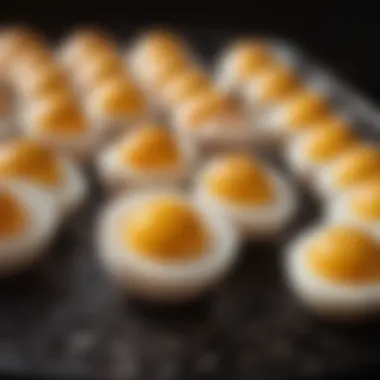
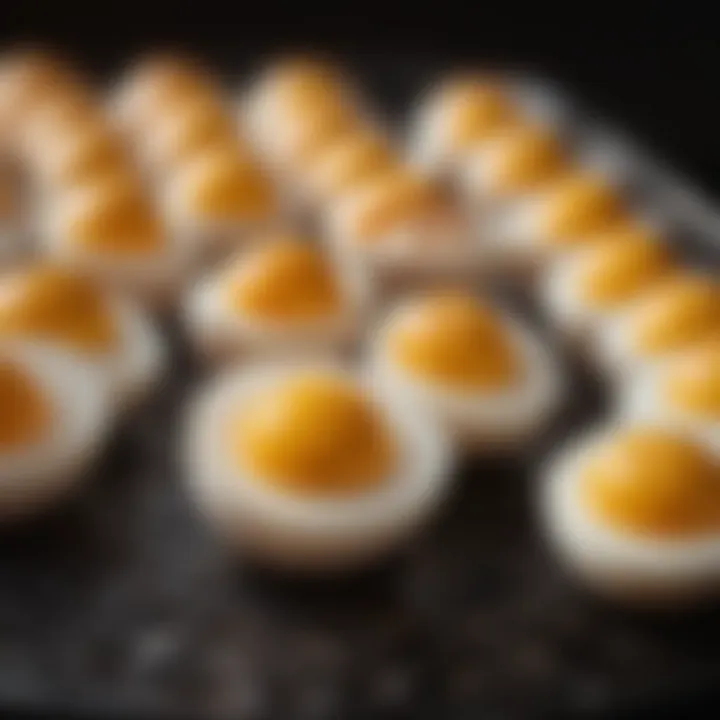
Post-Cooking Procedures
Post-cooking procedures are essential steps that follow the actual cooking of hard boiled eggs in an air fryer. These procedures play a significant role in ensuring that the eggs achieve the desired taste and texture. Proper cooling techniques prevent overcooking, while effective peeling strategies can enhance the overall presentation of the egg. Let's explore these aspects in more detail.
Cooling Techniques
After the cooking cycle is completed, managing the temperature of the hard boiled eggs is critical. Transferring the eggs immediately to an ice water bath is an effective method. This rapid cooling technique not only halts the cooking process promptly but also helps to further firm up the texture of the eggs. To perform this:
- Prepare an Ice Bath: Fill a large bowl with ice and cold water before cooking the eggs. This allows for an immediate transfer once the eggs are done.
- Transfer the Eggs: Use tongs or a slotted spoon to gently place the cooked eggs into the ice bath. Ensure they are fully submerged.
- Wait: Allow the eggs to cool in the ice bath for about 5 to 10 minutes. This cooling period is optimal for achieving easy peeling while preserving the egg's structural integrity.
By cooling the eggs quickly, you can mitigate the risk of the dreaded grayish-green ring forming around the yolk, which occurs due to prolonged cooking at high temperatures. This simple yet effective approach ensures that your eggs remain aesthetically pleasing and enjoyable to consume.
Peeling the Eggs
Peeling hard boiled eggs can sometimes be a challenging task, especially if the eggs were fresh. The goal is to remove the shell without damaging the egg itself. There are several techniques to facilitate easier peeling:
- Choose the Right Eggs: Older eggs are generally easier to peel than fresh ones. Consider buying eggs that have been refrigerated for a week or two.
- Crack and Roll: After cooling, gently tap the egg on a hard surface until the shell is cracked all over. Then roll the egg gently between your hands to loosen the shell further.
- Peel Under Running Water: Doing this under a stream of cold running water can help the shell slide off more easily. The water can get in between the shell and the egg, easing the process.
By employing these strategies, the task of peeling can become more manageable. Ultimately, the goal is to end up with beautifully intact eggs that can be used in various dishes or enjoyed on their own.
Tip: Always consider the texture and appearance of the eggs after peeling, as a torn surface may affect presentation, particularly for dishes served to guests.
Troubleshooting Common Issues
When cooking hard boiled eggs in an air fryer, common issues can arise. Identifying and addressing these problems is essential for achieving the best results. Instead of being a source of frustration, frequent cooking mishaps can actually provide valuable learning experiences. This section will focus on the most prevalent issues encountered during this cooking process, offering practical solutions for both novice and experienced cooks. Understanding how to troubleshoot these problems can enhance overall kitchen confidence and improve culinary skills.
Identifying Overcooked Eggs
Overcooked eggs are a common issue that can lead to undesirable texture and flavor. When eggs are cooked for too long in an air fryer, the whites can become rubbery, while the yolks develop a greenish tinge. This discoloration results from a chemical reaction between the sulfur in the egg whites and the iron in the yolk. Here are several indicators to tell if your eggs are overcooked:
- Texture: The egg white should be tender and slightly firm. Overcooked eggs feel rubbery and may have an unappealing bite.
- Color: A greenish-gray hue around the yolk is a clear sign of overcooking.
To prevent overcooking, it is important to adhere closely to the recommended cooking times for your specific air fryer model. Each appliance operates differently, making it crucial to adjust times based on your experience. Starting with a trial batch can help gauge the required time and temperature for perfectly cooked eggs.
Dealing with Shell Sticking
Shell sticking is another frequent complaint when hard boiling eggs. Some eggs seem to cling stubbornly to their shells, making peeling a frustrating task. This problem typically occurs due to the freshness of the eggs. Fresher eggs are often more challenging to peel, while older eggs tend to separate more easily from their shells. To mitigate the issue of sticking, consider the following approaches:
- Use older eggs: If possible, plan ahead and purchase eggs a week before cooking. This small change can significantly aid in the peeling process.
- Ice bath method: After cooking, immediately immersing the eggs in an ice bath can help relax the proteins in the egg whites, creating a gap between the whites and the shell.
- Tap method: Gently tap the egg against a hard surface to create cracks all around the shell. This can help ease the peeling process.
"Using older eggs and applying cooling techniques can greatly improve the peeling experience."
By implementing these troubleshooting tips, cooks can enhance their skills and delight in consistently beautiful hard boiled eggs. Identifying and addressing common challenges is an integral part of mastering the art of cooking with an air fryer.
Serving Suggestions
Serving suggestions are a crucial aspect of any culinary process, particularly when it comess to hard boiled eggs. Once you've perfected the cooking method using an air fryer, how you present and serve these eggs can elevate not only the dish but also the overall dining experience. Creative serving ideas not only entice the palate but also allow for versatility in meal preparation.
Incorporating diverse serving methods can transform hard boiled eggs into more than just a breakfast staple. By exploring various serving suggestions, you can appeal to different tastes and occasions, from simple snacks to elegant dishes. This section seeks to inspire creativity and encourage experimentation, guiding readers to integrate hard boiled eggs into their culinary repertoire effectively.
Creative Ways to Serve Hard Boiled Eggs
Hard boiled eggs are remarkably versatile and can be enjoyed in numerous ways. Here are several creative serving suggestions to consider:
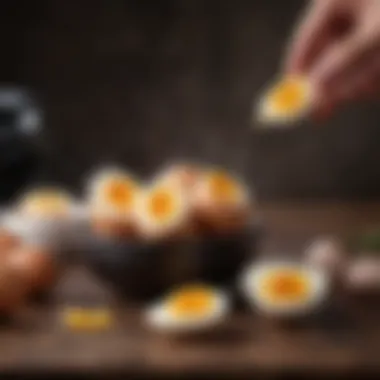
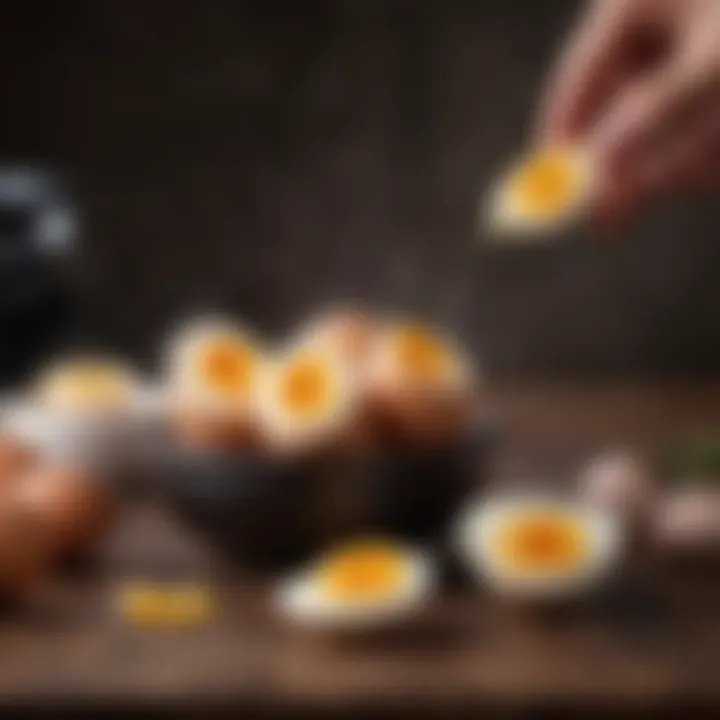
- Deviled Eggs: A classic party favorite. Simply mash the egg yolks with mayonnaise, mustard, and spices, then pipe the mixture back into the white halves.
- Egg Salad: Chop the eggs and mix them with mayonnaise, celery, and seasoning to create a delectable egg salad. This can be served on sandwiches or with crackers.
- Salad Toppers: Sliced hard boiled eggs can add protein and texture to any salad. They complement mixed greens, grain salads, or even pasta salads.
- Breakfast Bowls: Incorporate sliced eggs into grain bowls with quinoa, avocado, and roasted vegetables for a filling breakfast option.
- On Charcuterie Boards: Display eggs alongside cheeses, meats, olives, and fresh fruits for a beautiful and inviting charcuterie platter.
These ideas not only enhance the visual appeal but also allow for customization based on personal preference and dietary considerations.
Integrating Eggs into Meals
Hard boiled eggs offer the opportunity to enrich different meals throughout the day. Here are some ideas on how to effectively integrate them:
- Breakfast: Eggs can be a significant part of a nutritious breakfast. Pair them with whole-grain toast and avocado for a healthy start.
- Lunch: Incorporate eggs into grain bowls, wraps, or salads to add protein and satiation.
- Snacks: Serve eggs as a quick and healthy snack option, seasoned simply with salt and pepper or enjoyed with hot sauce.
- Dinner: Use eggs as a topping on ramen or as an ingredient in stir-fries to enhance flavor and texture.
- Party Dishes: Create appetizer platters with deviled eggs or mini egg salad bites to delight guests at gatherings.
Integrating hard boiled eggs into meals not only diversifies your diet but also provides a reliable source of protein and essential nutrients.
Storage and Shelf Life
Understanding the storage and shelf life of hard boiled eggs is crucial for both safety and quality. Improper storage can lead to spoilage, which not only affects taste but also poses health risks. Hard boiled eggs, when cooked correctly and stored in suitable conditions, can last a significant time. It is important to know how to store these eggs properly to enjoy their benefits for as long as possible.
Proper storage techniques are simple yet effective. Keeping hard boiled eggs in the refrigerator is essential. The ideal temperature for storage is below 40 degrees Fahrenheit (or 4 degrees Celsius). Use a covered container to prevent odors from neighboring foods from permeating the eggs. It is also recommended to store the eggs unpeeled until ready to eat. The shell acts as a natural barrier, preserving the freshness and moisture of the egg longer.
In summary, follow these storage techniques:
- Refrigerate hard boiled eggs promptly after cooking.
- Store them in a covered container.
- Keep eggs unpeeled until consumption.
- Ensure storage temperature is below 40°F.
Proper Storage Techniques
To maximize freshness, prepare the eggs for storage only after they have cooled. Once at room temperature, place the eggs directly in the fridge. If you wish to store them for longer than a week, consider peeling them, but store them in water to keep them moist and prevent them from drying out. Change the water periodically to ensure it remains clean.
It's also important to label the container with the date of cooking. This helps in keeping track of how long the eggs have been stored. Proper labeling prevents the accidental consumption of stale eggs, enhancing overall food safety.
Determining Freshness
Determining the freshness of hard boiled eggs is key. One simple method involves the water test. Fill a bowl with water and gently place the egg in it:
- Sinks to the bottom and lays flat: The egg is fresh.
- Stands upright on the bottom: The egg is still good but should be used soon.
- Floats to the top: This indicates spoilage; the egg should not be consumed.
Regularly checking on the eggs and having a clear understanding of their storage conditions ensures both safety and taste quality.
By following these guidelines for storage and assessing freshness, food lovers can confidently incorporate hard boiled eggs into their meals, knowing they are safe and delicious.
Culmination
The advantages of air frying hard boiled eggs are manifold. First, the method minimizes cooking times, making it suitable for a busy lifestyle. Next, it achieves consistent results, eliminating any guesswork typically associated with conventional boiling methods. Moreover, air frying can provide a unique ease in peeling, as cooked eggs often experience fewer issues with the shell sticking.
It's important to consider that every air fryer may present slight variations in performance. Therefore, it remains essential to monitor and adjust accordingly. The practices and tips shared in this article are meant to serve as guidelines, allowing one to build confidence in this new cooking technique. Emphasizing that mastery comes with practice, it encourages cooks to refine their skills, tailoring the process to fit their preferences.
"With patience and the right techniques, anyone can achieve the perfect hard boiled egg using an air fryer."
Ultimately, this article aims to empower readers to take their cooking experience to new heights by successfully integrating air frying into their egg repertoire. The blend of simple instructions and encouragement to explore allows for a rich culinary journey beyond the basics.
Final Thoughts on Air Frying Eggs
Air frying represents a modern approach to a classic cooking task. It emphasizes efficiency and precision, making the preparation of hard boiled eggs simpler and more enjoyable. As the popularity of air fryers rises in home kitchens, understanding this technique becomes essential. The ability to produce delicious, well-cooked eggs reflects not just on technique but on the overall pleasure of cooking.
Cooking eggs in an air fryer celebrates the balance between simplicity and taste. After mastering the timing and temperature, anyone can replicate the process seamlessly. Experimenting with slight variations in heat and duration may yield personalized results that cater to individual tastes. This is part of the fun and appeal of using an air fryer.
Encouragement to Experiment
Exploration in cooking leads to personal discovery and satisfaction. While this guide provides a solid foundation, do not hesitate to venture beyond the discussed methods. Try varying cooking times slightly to understand how it affects the final product. Take the time to test different fictional temperatures in your air fryer, as this may result in variations in texture and taste that you prefer.
Moreover, consider incorporating spices or flavorings to enhance the experience of enjoying hard boiled eggs. Some may choose to try techniques like marinating the eggs after cooking, or introducing them into salads and breakfast bowls. By stepping outside of the conventional framework, the process evolves into a creative outlet.
Culinary growth is rooted in experimentation. With the knowledge and skills developed from this article, approach the cooking of hard boiled eggs with an open mind. The air fryer can be adapted for innovative recipes and methods, making it a versatile tool in your kitchen arsenal.







